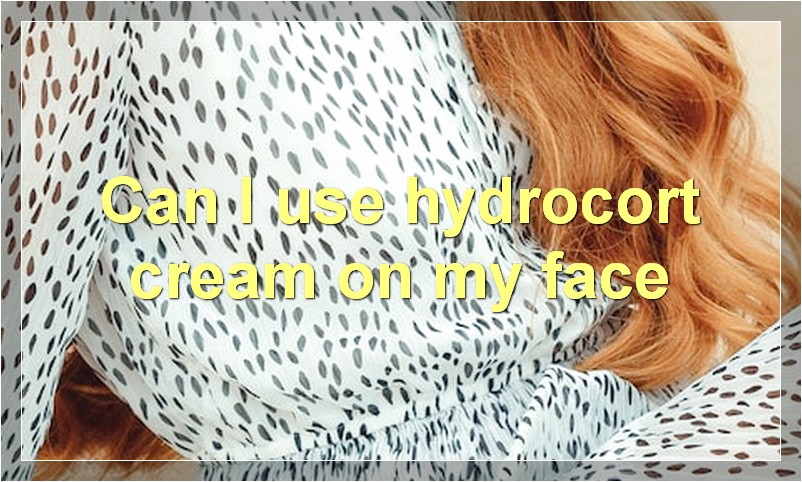Are you in pain? Do you have a rash? There’s a good chance that hydrocort cream can help. In this article, we’ll tell you everything you need to know about this popular medication.
What is hydrocort cream
Hydrocortisone cream is a topical steroid that can be applied to the skin to treat various inflammatory skin conditions such as eczema, psoriasis, and contact dermatitis. Hydrocortisone cream works by decreasing the inflammation in the skin.
Hydrocortisone cream is available over-the-counter (OTC) or by prescription from a doctor. OTC hydrocortisone cream is available in different strengths, ranging from 0.5% to 2.5%. Prescription hydrocortisone cream is usually more potent, with a strength of up to 10%.
Hydrocortisone cream is generally safe and effective when used as directed. However, long-term use of high-potency hydrocortisone cream can lead to side effects such as thinning of the skin, stretch marks, and lightening of the skin color. Hydrocortisone cream should not be used on broken or infected skin.
If you are using hydrocortisone cream and experience any irritation or other side effects, stop using the cream and consult your doctor.
How does hydrocort cream work

Hydrocort cream is a topical steroid that is used to treat inflammation and itching caused by a variety of skin conditions. The active ingredient in hydrocort cream is hydrocortisone, which is a type of corticosteroid. Corticosteroids are hormones that are produced by the adrenal gland in response to stress. They have a variety of effects on the body, including reducing inflammation.
Hydrocortisone works by binding to receptors on cells in the body that are involved in the inflammatory response. This prevents the release of substances that are responsible for the inflammation and itching. Hydrocortisone also has a direct effect on the cells that are causing the inflammation, which leads to a reduction in the inflammation.
The most common side effects of hydrocort cream include burning, stinging, and irritation at the site of application. These side effects are typically mild and resolve with continued use of the cream. Hydrocort cream is available over-the-counter and does not require a prescription.
What are the side effects of hydrocort cream
Hydrocort cream is a topical steroid that can be used to treat inflammation and itching caused by a variety of skin conditions. While hydrocort cream is generally safe and effective, it can cause side effects in some people.
The most common side effect of hydrocort cream is skin irritation. This can include redness, dryness, scaling, and burning. If these effects are severe or do not go away, you should talk to your doctor.
Other potential side effects of hydrocort cream include:
• Allergic reactions. Some people may be allergic to the ingredients in hydrocort cream. If you experience symptoms such as hives, difficulty breathing, or swelling of the face, lips, or tongue after using hydrocort cream, you should stop using it and see your doctor right away.
• Infection. If you have an open wound or broken skin, there is a risk of developing an infection if you use hydrocort cream. Be sure to wash your hands before and after applying the cream, and avoid contact with mucous membranes or open wounds.
• Hormonal changes. Hydrocort cream can be absorbed through the skin and into the bloodstream. This can lead to changes in hormone levels and potentially cause side effects such as acne, changes in menstrual cycle, or weight gain.
• Others. Some other potential side effects of hydrocort cream include thinning of the skin, stretch marks, and increased hair growth.
If you experience any side effects while using hydrocort cream, be sure to talk to your doctor.
Is hydrocort cream effective for acne
Acne is a common skin condition that affects people of all ages. The main symptom of acne is pimples, which can occur on the face, chest, back, shoulders, and neck. Hydrocort cream is a topical cream that contains hydrocortisone, a steroid that reduces inflammation. It is commonly used to treat acne by reducing the redness and swelling of pimples. Some studies have shown that hydrocort cream is effective in treating acne, but more research is needed. If you are considering using hydrocort cream for acne, talk to your doctor first to make sure it is safe for you.
How long does it take for hydrocort cream to work on acne
Acne is a common skin condition that affects people of all ages. The exact cause of acne is unknown, but it is thought to be due to a combination of factors, including hormones, bacteria, and oil production. Acne can occur on the face, neck, chest, back, and shoulders.
There are many different treatments for acne, including over-the-counter and prescription medications. Hydrocortisone cream is a common over-the-counter medication that is used to treat acne.
Hydrocortisone cream works by reducing inflammation and swelling. It is typically applied to the affected area two to three times per day. Most people will see an improvement in their acne within a few days of using hydrocortisone cream. However, it may take up to four weeks for the full effect of the cream to be seen.
If you are using hydrocortisone cream to treat your acne, it is important to follow the instructions on the package carefully. Do not use more or less of the cream than directed, and do not use it more often than directed. Be sure to wash your hands after applying the cream.
If you experience any side effects from hydrocortisone cream, such as burning, stinging, redness, or irritation, stop using the cream and contact your doctor.
Can I use hydrocort cream on my face

Yes, you can use hydrocort cream on your face. In fact, it is often prescribed by dermatologists to treat conditions such as eczema, psoriasis, and seborrhea. Hydrocort cream contains a steroid that helps to reduce inflammation and itching. It is important to use the cream as directed by your doctor or pharmacist in order to avoid side effects.
How often should I use hydrocort cream for acne
Acne is a common skin condition that can be treated with a variety of over-the-counter (OTC) and prescription medications. Hydrocortisone cream is a type of OTC medication that can be used to treat acne.
Hydrocortisone cream is a topical corticosteroid that can be used to reduce the inflammation and redness associated with acne. It is important to note that hydrocortisone cream should not be used as a spot treatment for acne breakouts, but rather applied to the entire area of skin affected by acne. In addition, hydrocortisone cream should only be used as directed by the package label or as prescribed by a healthcare professional.
So, how often can you safely use hydrocortisone cream for acne? According to the American Academy of Dermatology (AAD), hydrocortisone cream can be safely used twice daily for up to two weeks. If your symptoms do not improve after two weeks of treatment, or if they worsen, it is important to consult a healthcare professional.
When using hydrocortisone cream for acne, it is important to follow these tips:
• Apply a thin layer of cream to the affected area.
• Gently massage the cream into the skin.
• Do not apply the cream to broken or inflamed skin.
• Do not bandage or wrap the treated area unless directed by a healthcare professional.
• Wash your hands after applying the cream.
Will hydrocort cream dry out my skin
If you’re using hydrocortisone cream to treat a skin condition like eczema, psoriasis, or poison ivy, you may be wondering if the medication will dry out your skin. The short answer is that it’s possible, but it’s not necessarily a bad thing.
Hydrocortisone cream is a type of anti-inflammatory medication that can be used to treat a variety of skin conditions. The active ingredient in the cream works by reducing swelling, redness, and itchiness.
While hydrocortisone cream is generally safe for most people, it can cause some side effects, including dryness, irritation, and burning. These side effects are more likely to occur if you use the cream for more than a week or if you use a higher-strength formulation.
If you experience dryness or irritation after using hydrocortisone cream, you can try applying a moisturizer to your skin afterwards. You may also want to talk to your doctor about alternative treatments if the side effects are bothersome.
Is hydrocort cream safe to use during pregnancy
There are a variety of skin conditions that can occur during pregnancy, and hydrocortisone cream is commonly used to treat them. While the active ingredient in hydrocortisone cream is safe for use during pregnancy, you should always check with your doctor or midwife before using any medication.
Hydrocortisone cream is typically used to treat itchiness, redness, and swelling associated with skin conditions such as eczema and psoriasis. It works by reducing inflammation and irritation.
If you experience any skin problems during pregnancy, it’s important to talk to your doctor or midwife before using hydrocortisone cream or any other medication. This is because some skin conditions can be made worse by corticosteroids like hydrocortisone.
In general, it’s always best to use the lowest possible dose of hydrocortisone for the shortest amount of time necessary to control your symptoms. If you’re using hydrocortisone cream on a regular basis, it’s important to talk to your doctor about the potential risks and side effects.
Hydrocortisone cream is available over-the-counter and by prescription. If you’re using a prescription strength cream, be sure to follow your doctor’s instructions on how to use it safely.
What are some alternative treatments for acne
Acne is a common skin condition that affects people of all ages. There are many different treatments for acne, including over-the-counter and prescription medications. Some people may also try alternative treatments.
There is no one-size-fits-all treatment for acne, so it is important to find a method that works for you. Some people may need to try several different treatments before finding one that is effective.
Over-the-counter treatments for acne include topical creams, gels, and lotions that contain benzoyl peroxide or salicylic acid. These products can be bought without a prescription.
Prescription medications for acne include topical creams, oral antibiotics, and isotretinoin. Isotretinoin is a powerful medication that is only available from a doctor. It can have serious side effects, so it is only used as a last resort for severe acne.
Alternative treatments for acne include tea tree oil, aloe vera, and probiotics. These treatments are typically not as effective as traditional medical treatments, but they may be worth trying if other methods have not worked.





